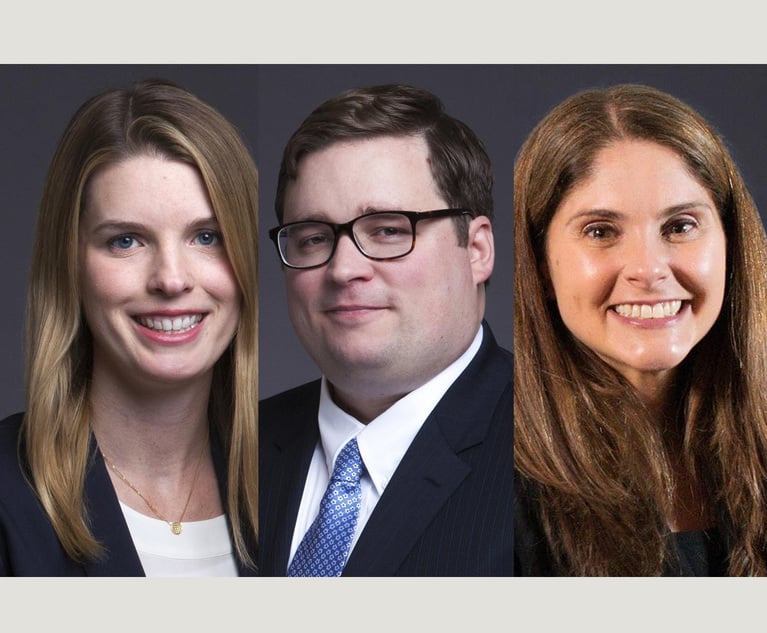Despite $64K Slip-and-Fall Verdict, Plaintiff Did Not Get Fair Trial, Court Finds
Although he was awarded nearly $64,000 by a Philadelphia jury, the plaintiff in a slip-and-fall case against hotel chain Marriott was prejudiced by his inability to submit testimony by a medical expert and is entitled to a new trial on damages, the Pennsylvania Superior Court has ruled.
April 11, 2019 at 12:51 PM
5 minute read
 Photo: DoublePHOTO studio/Shutterstock.com
Photo: DoublePHOTO studio/Shutterstock.com
Although he was awarded nearly $64,000 by a Philadelphia jury, the plaintiff in a slip-and-fall case against hotel chain Marriott was prejudiced by his inability to submit testimony by a medical expert and is entitled to a new trial on damages, the Pennsylvania Superior Court has ruled.
In Wright v. Residence Inn by Marriott, a three-judge panel of the appeals court reversed a Philadelphia judge's ruling denying a new trial to plaintiff Bryan Wright.
Wright injured his left shoulder and bruised his hip and shoulder when he slipped and fell on a patch of ice on a walkway outside the Residence Inn by Marriott, located in Horsham, according to the appeals court's published April 9 opinion.
Wright underwent treatment for his shoulder, including arthroscopic surgery, and intended to introduce expert testimony by Dr. Paul Sedacca regarding the nature and cause of his injuries, as well as the subsequent treatment, according to the opinion. But on the eve of trial the defense filed a motion in limine seeking to exclude Sedacca's testimony. The trial court ultimately found that Sedacca was unqualified because he was not an orthopedist, and barred all of the doctor's testimony aside from limited testimony on Wright's medical bills.
A jury ultimately entered a verdict finding that Marriott was negligent and that its negligence was the sole cause of Wright's injuries, awarding $8,896.44 for his medical expenses and $55,000 for noneconomic damages, the opinion said. Wright appealed, arguing that the award should have been higher but that he was prejudiced by the exclusion of Sedacca's testimony and timing of the defense's motion in limine, which left him unable to obtain a new medical expert prior to trial.
Judge Deborah Kunselman, writing for the Superior Court panel, said the judge misapplied the standard for admitting expert testimony. Sedacca, Kunselman said, “has dealt with patients in his practice who have orthopedic or shoulder-type injuries” and therefore “possessed a reasonable pretension to specialized knowledge regarding the Wright's medical issues sufficient to assist the trier of fact,” as required by the state Supreme Court's 1995 ruling in Miller v. Brass Rail Tavern.
“That an orthopedist may have been more qualified does not mean Dr. Sedacca was totally unqualified to serve as an expert on causation and damages in this personal injury case,” said Kunselman, who was joined in the result by Judge Jacqueline O. Shogan and joined in full by Judge Mary Jane Bowes.
The panel further found that Sedacca's preclusion from trial prejudiced Wright.
“Although Wright was successful on his claim, Wright did not get a fair trial on damages due to the preclusion of Dr. Sedacca's testimony,” Kunselman said. “Without Dr. Sedacca's testimony, Wright could not offer a credible medical perspective. Wright himself did not have any medical training or knowledge; he could only explain his personal experience—what happened, how he felt, and the treatments he received. However, there was no objective expert medical testimony to corroborate his subjective testimony.”
“Dr. Sedacca's testimony was critical to fully explaining to the jury what happened to Wright physically, how his injuries affected him and the extent to which they affected him,” Kunselman continued. “Most significant though is that Wright was not able to present evidence of his prognosis and the impact this injury would have on him into the future.”
The error was compounded when Marriott emphasized to the jury during closing argument that Sedacca had failed to put forth any medical expert testimony, Kunselman said.
Turning to the matter of the scope of a new trial, Kunselman said the parties had a fair opportunity to litigate the issues of negligence and contributory negligence, but not the issue of causation between Wright's fall and his injuries.
For that reason, the court ordered a new trial on damages only.
“Because the extent of Wright's injuries resulting from the fall must be proven again, both parties may present evidence of the damages Wright sustained as a result of his fall,” Kunselman said. “In other words, both parties will have the opportunity to present a full and fair case on the question of damages.”
Wright's attorney, Robert Gelinas of Philadelphia, said he was glad that the Superior Court upheld Miller's standard for admitting expert witnesses and that his client will now be allowed to submit medical expert testimony.
“We hope to get a different verdict once we can establish he suffered an internal derangement of his shoulder,” Gelinas said.
Marriott's attorney, Paul Leary Jr. of Cozen O'Connor in Philadelphia, could not be reached for comment.
(Copies of the 19-page opinion in Wright v. Residence Inn By Marriott, PICS No. 19-0445, are available at http://at.law.com/PICS)
This content has been archived. It is available through our partners, LexisNexis® and Bloomberg Law.
To view this content, please continue to their sites.
Not a Lexis Subscriber?
Subscribe Now
Not a Bloomberg Law Subscriber?
Subscribe Now
NOT FOR REPRINT
© 2025 ALM Global, LLC, All Rights Reserved. Request academic re-use from www.copyright.com. All other uses, submit a request to [email protected]. For more information visit Asset & Logo Licensing.
You Might Like
View All
Lawsuit Against Major Food Brands Could Be Sign of Emerging Litigation Over Processed Foods
3 minute read

People in the News—Jan. 23, 2025—Marshall Dennehey, Duane Morris, Hangley Aronchick
3 minute read
Plaintiff Argues Jury's $22M Punitive Damages Finding Undermines J&J's Talc Trial Win
4 minute readTrending Stories
- 1We the People?
- 2New York-Based Skadden Team Joins White & Case Group in Mexico City for Citigroup Demerger
- 3No Two Wildfires Alike: Lawyers Take Different Legal Strategies in California
- 4Poop-Themed Dog Toy OK as Parody, but Still Tarnished Jack Daniel’s Brand, Court Says
- 5Meet the New President of NY's Association of Trial Court Jurists
Who Got The Work
J. Brugh Lower of Gibbons has entered an appearance for industrial equipment supplier Devco Corporation in a pending trademark infringement lawsuit. The suit, accusing the defendant of selling knock-off Graco products, was filed Dec. 18 in New Jersey District Court by Rivkin Radler on behalf of Graco Inc. and Graco Minnesota. The case, assigned to U.S. District Judge Zahid N. Quraishi, is 3:24-cv-11294, Graco Inc. et al v. Devco Corporation.
Who Got The Work
Rebecca Maller-Stein and Kent A. Yalowitz of Arnold & Porter Kaye Scholer have entered their appearances for Hanaco Venture Capital and its executives, Lior Prosor and David Frankel, in a pending securities lawsuit. The action, filed on Dec. 24 in New York Southern District Court by Zell, Aron & Co. on behalf of Goldeneye Advisors, accuses the defendants of negligently and fraudulently managing the plaintiff's $1 million investment. The case, assigned to U.S. District Judge Vernon S. Broderick, is 1:24-cv-09918, Goldeneye Advisors, LLC v. Hanaco Venture Capital, Ltd. et al.
Who Got The Work
Attorneys from A&O Shearman has stepped in as defense counsel for Toronto-Dominion Bank and other defendants in a pending securities class action. The suit, filed Dec. 11 in New York Southern District Court by Bleichmar Fonti & Auld, accuses the defendants of concealing the bank's 'pervasive' deficiencies in regards to its compliance with the Bank Secrecy Act and the quality of its anti-money laundering controls. The case, assigned to U.S. District Judge Arun Subramanian, is 1:24-cv-09445, Gonzalez v. The Toronto-Dominion Bank et al.
Who Got The Work
Crown Castle International, a Pennsylvania company providing shared communications infrastructure, has turned to Luke D. Wolf of Gordon Rees Scully Mansukhani to fend off a pending breach-of-contract lawsuit. The court action, filed Nov. 25 in Michigan Eastern District Court by Hooper Hathaway PC on behalf of The Town Residences LLC, accuses Crown Castle of failing to transfer approximately $30,000 in utility payments from T-Mobile in breach of a roof-top lease and assignment agreement. The case, assigned to U.S. District Judge Susan K. Declercq, is 2:24-cv-13131, The Town Residences LLC v. T-Mobile US, Inc. et al.
Who Got The Work
Wilfred P. Coronato and Daniel M. Schwartz of McCarter & English have stepped in as defense counsel to Electrolux Home Products Inc. in a pending product liability lawsuit. The court action, filed Nov. 26 in New York Eastern District Court by Poulos Lopiccolo PC and Nagel Rice LLP on behalf of David Stern, alleges that the defendant's refrigerators’ drawers and shelving repeatedly break and fall apart within months after purchase. The case, assigned to U.S. District Judge Joan M. Azrack, is 2:24-cv-08204, Stern v. Electrolux Home Products, Inc.
Featured Firms
Law Offices of Gary Martin Hays & Associates, P.C.
(470) 294-1674
Law Offices of Mark E. Salomone
(857) 444-6468
Smith & Hassler
(713) 739-1250





